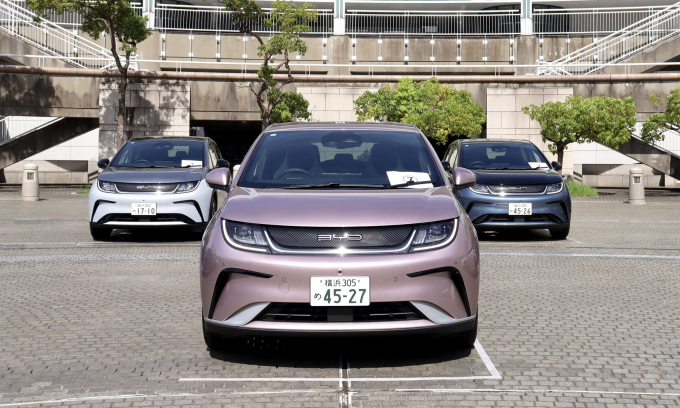
Honda’s CEO acknowledged that the rise of Chinese automakers has transformed the global automotive industry.
Amid the growing challenge from China's electric vehicle (EV) sector, Japanese automakers are seeking ways to safeguard their future. Honda and Nissan, two of Japan’s top three car manufacturers, are in negotiations to strengthen ties, including the possibility of establishing a holding company.
Honda and Nissan have lost market share in China, the world’s largest auto market, where domestic brands like BYD are dominating with advanced EVs and hybrids featuring cutting-edge software.
The Rise of BYD
Among Chinese automakers, BYD has seen remarkable growth. From January to November this year, BYD’s cumulative sales reached 3.758 million vehicles, up 40% from the same period in 2023. The company is on track to achieve annual sales of 4 million vehicles.
Honda reported a 15% drop in quarterly profits last month, citing declines in the Chinese market and announcing workforce reductions there. Nissan, struggling for years, plans to cut 9,000 jobs globally and reduce production capacity by 20% due to declining sales in China and the U.S.
Sanshiro Fukao, a researcher at the Itochu Research Institute in Tokyo, warned that the pace of innovation by Chinese EV manufacturers leaves Honda and Nissan with "no time" to continue business as usual.
The Role of Japan’s Auto Industry
The potential decline of Japan’s auto industry would be devastating. As the strongest sector in the world’s fourth-largest economy, its performance is critical, especially as other industries like consumer electronics and semiconductors have weakened over the years.
“For Japan, it all revolves around automobiles. If the auto sector doesn’t improve, Japan’s entire manufacturing base will stagnate,” said Takumi Tsunoda, senior economist at the Shinkin Central Bank Research Institute.
Japan’s auto supply chain includes approximately 60,000 companies, with an estimated total transaction value of 42 trillion yen ($270 billion), accounting for 7% of nominal GDP in the 2023 fiscal year, according to a survey by Teikoku Databank. The industry employs over 5 million people, or 8% of the national workforce, according to the Japan Automobile Manufacturers Association (JAMA).
Challenges in the EV Transition
While mergers like Honda and Nissan’s could reduce costs and allow resource sharing, the question remains whether Japan’s auto industry—like its counterparts in the U.S. or Germany—can remain competitive in the EV sector.
Japanese automakers have traditionally thrived on the "monozukuri" philosophy—efficient production and management systems aimed at achieving the highest quality—heavily influenced by Toyota’s leadership. These practices helped Japan’s auto industry flourish in the late 20th century.
However, the shift to smart, battery-powered vehicles has shifted consumer focus to software-dependent autonomous driving features and digital experiences—areas where Chinese automakers excel.
Toyota has been vocal about the potential negative impacts of a full-scale EV transition. Chairman Akio Toyoda warned in October that an all-electric future could lead to significant job losses, particularly among suppliers and workers involved in engine production. Toyota continues to advocate for a “multi-pathway” strategy, encompassing hybrids, hydrogen vehicles, and EVs.
Chinese Automakers Expanding Globally
Chinese automakers, producing not only cheaper vehicles but also highly competitive EVs, are targeting international markets, including key regions for Japanese automakers such as Europe.
In the first half of this year, China surpassed Japan to become the world’s largest car exporter. Notably, Chinese automakers are also eyeing Japan—Honda and Nissan’s home turf. BYD has been expanding aggressively in Japan, where domestic manufacturers hold over 90% market share, primarily dominated by internal combustion engine vehicles.
BYD entered the Japanese market in July 2022, introducing three models: Seal, Dolphin, and Atto 3 (also known as Yuan Plus in China). Within a year, BYD had established around 50 sales outlets across Japan, including pop-up stores.
Interestingly, BYD has also collaborated with Toyota to produce EVs. Toyota’s first electric sedan, the bZ3, was co-developed with BYD and incorporates BYD’s Blade LFP batteries and electric motors.
The Need for Adaptation
“The competitive landscape of the global auto market is shifting rapidly with the rise of EVs. Japanese automakers need to adapt to this new model of growth and make timely adjustments,” said Xiang Haoyu of the China Institute of International Studies (CIIS).
(Sources: Reuters, NPR)
Hello Shuttle will strive to bring the latest updates. At the end of the day.
Are you looking for reliable airport and cruise port transfer services in Los Angeles?
We offer professional, safe, and punctual transportation from
Los Angeles Airport - LAX
Long Beach Airport - LGB
John Wayne Airport - SNA
San Pedro cruise port
Long Beach cruise port
Disneyland
and other destinations.
Let us make your journey stress-free and comfortable with our dedicated drivers and high-quality vehicles. Book now for the perfect travel experience at www.helloshuttle.com or call 944-800-5678!


